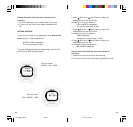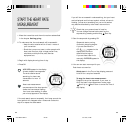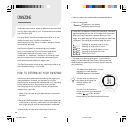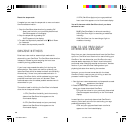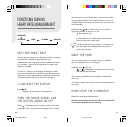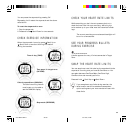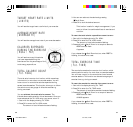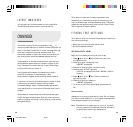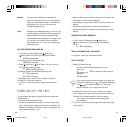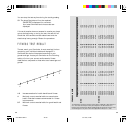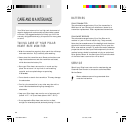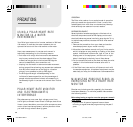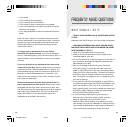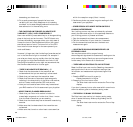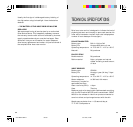
39
38
To be able to follow your fitness progress start with
measuring your OwnIndex a couple of times during the
first two weeks to get a reliable baseline value. Thereafter
repeat the test approximately once a month. Polar Fitness
Test is targeted to healthy adults.
FITNESS TEST SETTINGS
To be able to carry out the Polar Fitness Test you need to do
the following settings:
• Select your long-term physical activity level.
• Set the Fitness test mode on.
SET THE ACTIVITY LEVEL
Begin with the display showing the time of day.
1. Press Scroll Up or Scroll Down until you enter
the Options mode.
2. Press OK to enter the setting loop.
USER SET is displayed.
3. Press OK to enter the user information loop.
4. Press OK until ACTIVITY appears.
ACTIVITY is displayed and LOW / MIDDLE / HIGH is
flashing.
5. Press Scroll Up or Scroll Down to select the
right activity level.
6. Press OK to lock your selection.
USER SET is displayed.
7. To return to the Time of day display, press and hold
OK.
Activity Level
Assess your long-term physical activity level. Do not change
your activity level description if your regular exercise habits
have changed less than six months ago.
Low Exercise is not a regular part of your life. You walk
only for pleasure or occasionally exercise sufficiently
to cause heavy breathing or perspiration.
LATEST OWNINDEX
You can see your OwnIndex based on your latest Polar
Fitness Test and the date when it was carried out.
OWNINDEX
OwnIndex is a score which is comparable to VO
2max
, a
commonly used descriptor of aerobic fitness. OwnIndex is a
result of the Polar Fitness Test™, which is an easy, safe and
quick way to estimate maximal aerobic power. The
OwnIndex is based on heart rate, heart rate variability at
rest, body structure and self-assessed physical activity.
Cardiovascular or aerobic fitness relates to how well your
cardiovascular system works to transport oxygen to your
body. The better the cardiovascular fitness, the stronger
and more efficient your heart is.
Having good cardiovascular fitness has many health
benefits. For example, it decreases your risk of
cardiovascular diseases, stroke and high blood pressure.
If you want to improve your cardiovascular fitness, it takes
a minimum of 6 weeks of regular training to see a
noticeable change. Less fit individuals see progress even
more rapidly and for more active individuals more time is
needed.
Cardiovascular fitness is best improved by exercise types
which use large muscle groups. Such activities include e.g.
walking, jogging, swimming, rowing, skating, cross-country
skiing and cycling.
man M91ti USA A 13/11/00, 12:0238-39



